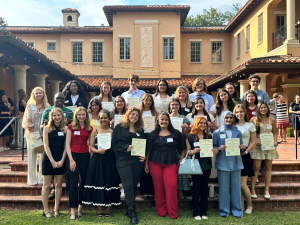
Rollins College President Grant Cornwell has signed an open letter from the American Association of Colleges and Universities (AAC&U) “oppos[ing] undue government intrusion in the lives of those who learn, live, and work on our campuses”.
The public statement, entitled “A Call for Constructive Engagement,” was initially co-signed by presidents from over 150 colleges and universities across the country. In the days since its release, though, that number has more than tripled—by April 26 at 3 p.m. ET, there were 509 signatories. The AAC&U says that it is continuously accepting signatures for the statement from not only colleges and universities but from scholarly societies as well.
Cornwell publicly commented on his decision to sign the statement in The Chronicle of Higher Education:
“If a president can’t defend and explain the core principles of teaching and research, then the whole system is broken and under siege,” he said. “I do not feel this was a risky thing to do. I feel this was a thing that it was my duty to do.”
The public display of resistance came just a day after Harvard University, a co-signer on the letter, announced that it had filed a suit to halt a federal freeze on $2.2 billion in grants that the Trump administration revoked after the university refused to comply with demands to limit student activism on campus.
These demands—among others—included a mask ban, the “shutter[ing] of all diversity, equity, and inclusion [DEI] programs,” and the establishment of an external party that will audit several of the university’s schools and organizations that the Trump administration insists “most fuel antisemitic harassment or reflect ideological capture.” Similar federal funding revocations with demands like those made in the April 11 letter to Harvard have occurred at other major educational institutions including Columbia University, which notably agreed to the demands back in March.
Insistences of rooting out antisemitism within these demands appear to indicate a crackdown by the Trump administration regarding student protests against the ongoing Israeli bombing campaigns and the forced displacement of Palestinians living in Gaza. Within the April 11 letter sent to Harvard, for example, the generalized accusation of multiple departments fueling antisemitism was not coupled with any mention of the issues of anti-Arab discrimination or Islamophobia—despite the fact that Harvard created task-forces to address both antisemitism and Islamophobia in January 2024.
In an email addressed to the Rollins community on April 24, Cornwell also took the time to reaffirm the college’s “unwavering support for our international students, faculty, and staff.” This came amidst increasing instances of international students losing visas as a part of crackdowns from U.S. Immigration and Customs Enforcement (ICE). At least ten of Florida’s public universities have signed agreements stating that they would work with ICE to help facilitate immigration enforcement on their campuses—which has led to 15 students at the University of Central Florida losing their visas since March 25.
In his email, Cornwell encouraged international students to consult with the Office of International Student and Scholar Services. He also encouraged faculty and staff members with immigration-related concerns to contact Human Resources to access assistance including an immigration attorney.











Comments are closed.